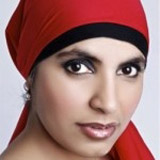 It had been raining for three days solid before I arrived at Atme refugee camp, in North Syria. I was there with Rola*, a British Syrian doctor and medical co ordinator of UK registered charity, Hand in Hand for Syria, to review the camp’s medical centre.
It had been raining for three days solid before I arrived at Atme refugee camp, in North Syria. I was there with Rola*, a British Syrian doctor and medical co ordinator of UK registered charity, Hand in Hand for Syria, to review the camp’s medical centre.
Children wearing sandals came to speak to us. I shivered in my heavy boots and thick jacket. The climate felt damp and cold and yet the children stood there wearing thin muddy layers. The odd combination of clothes indicated the speed at which their mothers had packed as they fled airstrikes hitting their villages.
Mohammed, a young man from Idlib, pulled out his mobile phone. As an English speaker, he had found a position for himself as an interpreter, working with the trickle of journalists that make it here. “All my street was destroyed, and here is the unexploded bomb that landed intact on my house,” he told me as he showed me a picture of an explosive device sitting intact on a pile of rubble that was once his home. Now he, his mother, father, and three sisters are living in a tent.
Rola greeted health workers at the medical centre. She asked about the condition of a badly injured woman being cared for in a Turkish hospital. The mother had lit a candle in her tent for light—there is little access to electricity and generators. The tent caught light, quickly becoming a fireball. Her two children died in the blaze and she is in intensive care in Turkey with 70% burns. Such is the misery here.
The medical centre is a small huddle of portacabins, with a consultation room and a moderately stocked, and organised pharmacy. It had not always been this way, explained Rola. It’s down to small grassroots NGO’s like Hand in Hand for Syria working together with other medical agencies, in this case the International Medical Corps, to get it like this. During the day there are two doctors working and during the night a nurse covers. The medical centre is stretched however, dealing with primary care issues for 10,000 internally displaced refugees with no specialty input.
Obstetric support is limited. The nearest facility, a private hospital in Aleppo, is two hours away. Many families cannot afford to pay, and the journey is dangerous. Consultant obstetrician, Dr Aisha*, who left her Aleppo home seeking a safer place for her family, is their only option. Her clinic was destroyed in an airstrike. Together with her husband, a lecturer, and five children, she left with only what they could carry, accepting that everything else would be lost. They used the last of their money to buy a small house—escaping the misery of camp life. But money is exceptionally tight, especially since her husband is not working. However, her skills are essential and much needed. For the last three months she has been delivering babies on the kitchen table or living room floor in the dark. The village has not had electricity for a few weeks, and they can’t afford a generator. And yet the hospitality we received was humbling, with a feast conjured up to welcome us into their home.
Hand in Hand for Syria is building an extension to her house, moving the delivery suite to a more clinically appropriate setting. I asked her what happens when there is a complication in a delivery and the road to is too dangerous to travel on.
“Then it is a problem,” she said quietly, offering no more. The responsibility of safe delivery will sit heavily on her shoulders no doubt.
The reality of this revolution struck us at the Turkish border. A civilian woman shot in the head in Aleppo and two injured fighters were being blue-lighted into Turkey. Jumping into the back of the ambulance, Rola administered pain relief as the Turkish border guards coordinated letting paramedics through onto the Syrian side to retrieve the casualties. Their fluorescent uniforms and critical care equipped ambulance just a few feet across the border were a welcome sight in amongst the confusion and poor resources.
As we prepared to leave Syria Rola got a call. That evening a town called Hamah, four hours’ drive away, had been heavily hit, resulting in a mass movement of up to 1000 people heading towards Atme. They were travelling through the bitter night to secure some protection against airstrikes, but there would be nowhere to accommodate them when they arrived. There were no extra tents or supplies. Rola got back onto her persistently ringing phone to find a solution.
“They will be sleeping on the mosque floor until we can work out what to do,” she explained. There may be some frightened and maybe some injured amongst them. Rola felt frustrated by the lack of international support for an ever evolving situation.
Dr Aisha’s real name is not given to protect her identity.
Dr Rola first name only is used to protect her identity.
Saleyha Ahsan is a British doctor and a freelance journalist.
